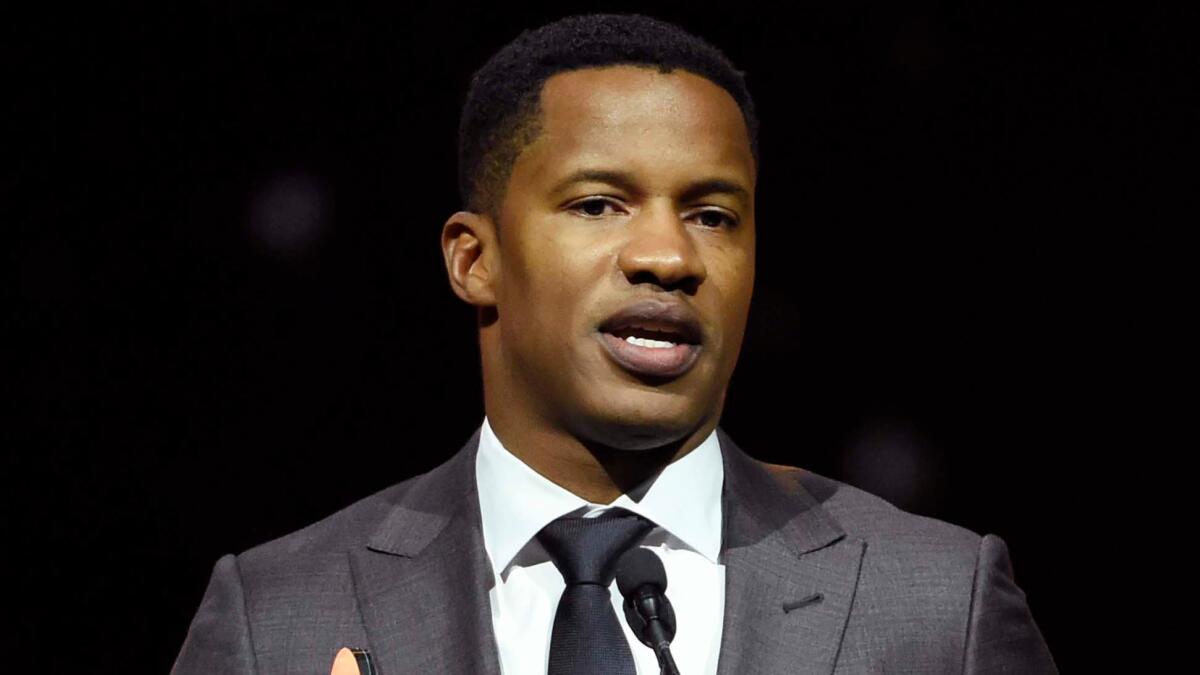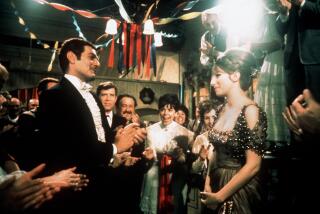At ‘Birth of a Nation’ forum, Nate Parker deflects questions about sex assault allegations

Two days into the official “The Birth of a Nation” Oscar tour, the elephant in the room was finally acknowledged, though it remained for the most part undisturbed.
After a pair of Toronto International Film Festival screenings Friday that saw no mention of Nate Parker’s past sexual assault trial and a press conference Sunday morning largely devoted to the themes of the film, Parker was finally asked about the subject.
The first question involved his response to those filmgoers who said they wouldn’t see Parker’s Nat Turner slave-revolt film because of the resurfaced allegations stemming from the 1999 incident at Penn State. He replied by turning attention to his fellow actors, nearly 10 of whom sat on the podium with him.
“I would say: ‘You know I’ve addressed it; I’m sure in future forums I will address it more. There’s no one person who makes a film.’” he said to reporters, continuing a weekend posture in which the filmmaker has sought to turn attention to some degree away from himself. “There are so many people away from their families, they spent time in post until this very moment…Everyone who sweat and bled for their work should be rewarded.”
See the most-read stories in Entertainment this hour »
He continued, “I would encourage everyone to remember, personal life aside, I’m just one person. There was never one person [on the film]. We did our best to create atmosphere where everybody felt included.” He wound down with, “Nat Turner has healing qualities and progresses us all forward. The legacy of Nat Turner is important to us — he healed all of us.”
Two more questions would follow for Parker, about separating art from artist and whether he feels there are Hollywood double standards in judging people for past sins. He declined to offer much elaboration on either.
“This is a forum for the film, for the other people sitting on this stage. It’s not mine,” Parker said to the first question. “I don’t want to hijack this for my personal life. I just want to honor this film and move it forward.” He then thanked TIFF for including the film in its slate.
The second inquiry yielded a similarly careful response.
“I don’t pretend to be an expert on reactions of anyone. I’m a filmmaker. I feel like this is my calling,” Parker said to the question about double standards. “I’m going to stay in that lane. When we’re talking about injustice we all have jobs to do,” referring to the journalists in the room as well as the filmmakers on stage, adding that he thought both jobs would “progress us forward as a nation, progress us forward as a planet and put forth an effort that can raise all ships.”
The subject stayed largely out of sight for much of the hour, as cast members that included Colman Domingo, Gabrielle Union, Aunjanue Ellis and Jackie Earle Haley spoke movingly about the challenges of injustice and the struggle against racial inequality, prompted by questions about the film from moderator Cori Murray, from Essence magazine.
As important as the issues were, though, another pressing matter was on the minds of (and the reason for) so many people in the room. The contrast between the passion on stage and the impatience of the reporters was palpable, providing one more bizarre turn in an Oscar campaign that has already been filled with them. On Friday night, two high-profile Toronto screenings had the celebratory and self-confirming air of many well-received Oscar contenders; despite a month of intense online conversation about the Parker allegations, the rooms greeted the films as if nothing had happened.
See more coverage from the Toronto Film Festival »
The press conference was a similar attempt to forge ahead with the awards roll-out. But the rudiments of Oscar campaigning took on a strange and at times awkward feel when contrasted with the grave issue that hung above the film. Some reporters in the room were stirring at the line of reasoning in Parker’s first response, which made the argument that, even if people couldn’t forgive him, they shouldn’t punish all the others who worked on the movie.
The Parker allegations did come up once more during the course of the Sunday proceedings. Union had penned a potently worded op-ed in The Times earlier this month in which, while frankly describing her rape as a teenager, she also questioned Parker’s actions in 1999. She was asked at the press conference about the Hollywood reaction to the piece.
“I heard from people I didn’t know existed,” she said. At a party in Toronto on Saturday night, she said that “people were hugging me, high-fiving me.” Universal chief Donna Langley had embraced her, she said, among many others.
That reaction, she noted, was emblematic of “90%” of people in Hollywood. “Five percent thinks I threw Nate under the bus. The other 5% thinks I’m a rape apologist. And those 5 percents should talk to each other.”
MORE:
Young and dislocated, Devon Terrell on playing a young and dislocated Barack Obama
On Twitter: @ZeitchikLAT
More to Read
Only good movies
Get the Indie Focus newsletter, Mark Olsen's weekly guide to the world of cinema.
You may occasionally receive promotional content from the Los Angeles Times.







